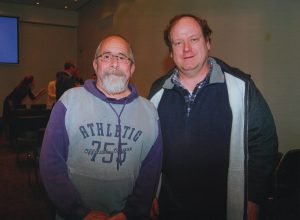
Phillip James (Phil) Carswell OAM
20 October 1953 – 17 March 2024
“I consider it an honour to be part of the process of documenting the history, because history is important.” – Phil Carswell, interviewed on 20 November 2013.
The man who spoke these words was someone whom I consider to be a leader, mentor, colleague, and model human rights activist. He spoke to me in an interview about how proud he was to contribute to documenting the history of thousands of people, but he was somewhat humble about admitting that he was in no small part personally responsible for contributing to that history. In turn, I am proud today to give my own personal testimony of this man and help to document one very small part of Phil’s own story.
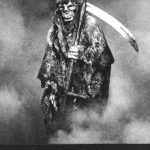
From a national perspective, no history of HIV/AIDS in Australia would be complete without reference to the man whose remarkable community roles included Founding President of the Victorian AIDS Action Committee (later the Victorian AIDS Council, now known as Thorne Harbour Health); Co-Convenor of the Australian AIDS Action Committee (AAAC – later the Australian Federation of AIDS Organisations, or AFAO); and membership of the AIDS Liaison Committee of Victoria. He also served on board the Australian Government’s National Advisory Committee on AIDS (NACAIDS); the Australian National Committee on AIDS (ANCA); and the Intergovernmental Committee on AIDS (IGCA).
And yet this only barely touches upon his wider life of activism. As a teacher and unionist, he was involved in a move to publish ‘Young, Gay and Proud’, possibly the first positive book in the world for young LGBT+ people. As a gay lib activist, he was involved in early LGBT+ conferences/protests in Australia. As a young member of the Communist Party, he learnt organisational skills. As a student, he became involved in activist causes ranging from anti-uranium protests and anti-Vietnam moratoria, to support for women’s liberation and Palestine.
His official online obituary summarised the linkages between his professional work and personal activism:
“Phil went on to become the first openly gay man employed by the Victorian Health Department to work on AIDS prevention. He later moved to Queensland where he worked for Queensland Health for over 20 years.”

Including Everyone in the Human Family
On 16 June 1983, members of the local gay community held an emergency public meeting at the Anderson Auditorium of the Royal Dental Hospital in Melbourne. In 2004, Phil Carswell described those present at that early gathering: “…a room full of scared and anxious gay men and some lesbians heard from a panel of doctors and researchers all that they then knew about this strange new “gay cancer”.”
A month after this first meeting, a forum of ten gay men and one lesbian assembled at the Laird Hotel on 12 July 1983 and agreed to establish the organisation that eventually became the Victorian AIDS Council. Phil Carswell volunteered to be the Convenor – later the President.
Decades later, while attending the 25th anniversary celebrations for the Victorian AIDS Council, Phil Carswell was to utter some words which hinted at the dread and apprehension which they all felt back in those early days: “Looking ahead, I thought I could see a tsunami was coming. What I failed to understand was that it wasn’t just a tsunami; it was a whole climate change.”
It’s no surprise that he became involved in the public response – in describing his humanist ethics in 2022, he revealed his heart for the disempowered and disadvantaged:
“Everybody deserves compassion, everyone is worthy of love and care, and all those who are shunned by parts of society (sex workers, injecting drug users, gay men) needs to be included in the great human family.”
This compassion extended to education: in 1983, he and Alison Thorne wrote an article for a education union magazine in response to AIDS jokes that were becoming commonplace in both classrooms and staffrooms within Australian schools. They highlighted these jokes as being anti-gay and insensitive (“when people are dying it’s not a joke”) and called for teachers to make a conscious choice to be positive transmitters of information and attitudes.
A Teacher of Life-Long Learning
Phil was like an explosion when he entered a room, always full of passion, drive and energy. Channelling that explosive energy in positive directions enabled him to contribute to many social justice causes, but also empowered him to befriend and work collaboratively with many people. I was one such person. I met Phil in 1992 through the AIDS Memorial Candlelight Vigil in Melbourne, and the Victorian chapter of the Australian AIDS Memorial Quilt Project – both activities he had co-founded – and our mutual background in teaching and activism helped us become interested in working for similar causes and outcomes. One of his first acts for me was to take me to the Victorian Health Department and load me up with every possible booklet and brochure on HIV and AIDS so that I might learn and also pass this information forward. He then kept in touch with me for over thirty years to advise and assist on a variety of related matters. How Phil managed to find time to work collaboratively with me and so many other people is testimony to his gregarious nature and his limitless energy.
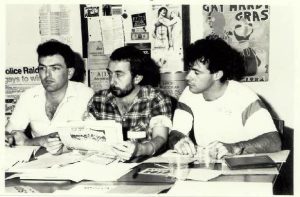
Phil’s activism remains a demonstration of the linkages between the personal and the political: he apparently inherited his mother’s passion for activism and making a difference, starting activism during his student days. As part of his activism, he became involved in counter-cultural politics that saw marriage as oppressive and sexist, and experimented with other forms of extended family units. Ultimately, though, some of the activism for HIV/AIDS that he spearheaded, would lead to marriage equality a generation later. He married his husband Ian in New York in 2013 – but he recounted another personal triumph that same year when he spoke to me about one change in society that his activist work had achieved: “Prior to 1980, we were illegal.” (As testimony to Phil’s own humanity, in his haste to impart information in his inimitable style, he accidentally misstated 1990 as being the date in question, but it is clear from the context that he is referring to decriminalisation of homosexuality in Victoria, which was passed in Victorian Parliament on 18 December 1980.)

As if that was not enough, Phil lived through an era where a virus was decimating communities of marginalised, stigmatised people – particularly gay men, but many others as well – and despite open discrimination and a lack of anti-discrimination protection, he was willing to be the public face and public spokesman for others who dared not speak their name. The Australian mass media had variously ignored, stigmatised, vilified or sensationalised gay men and their AIDS-related problems; Phil became a spokesman, speaking on everything from the availability of medicine or condoms, to the need for gay men to seek medically backed information beyond the shallow, homophobic, inadequate material found in newspapers or TV news. He spoke for those who could not speak for themselves and encouraged affected communities towards self-empowerment. He thus became the voice of a generation.
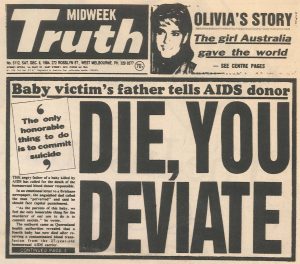
Having left teaching, Phil spoke to me in 1992 about the need for every teacher who was LGBT+ or an HIV/AIDS activist to immediately ‘come out’, and I knew that this was difficult or impossible for many teachers in the days before anti-discrimination protection laws – but I understood that he had felt a sense of personal liberation in coming out himself, and this empowerment enabled him to undertake activism above and beyond that of the average person. Although he was now an ex-teacher, Phil found himself following a much more education-based calling: spreading life-saving information and compassion. Such activism gained him an Order of Australian in 2015.
Legacy
In 2013, he passionately testified to events that happened possibly thirty (or more) years previously, and yet he could readily recall (and speak loquaciously about) an extensive range of events, details, people and minutiae. Even when speaking about the suffering and death of those lost in an epidemic, he retained a vital, positive outlook – his eyes sparkled as he remembered past friends and past activist campaigns, and his words tumbled out at warp factor speed as he sought to fully tell each story within the limited time available – and even then he spoke all through his assigned lunch time just so he could tell more. This was typical of Phil – making himself selflessly available for all forms of activism – which is why his passing will be mourned by many, many people in communities across Australia and beyond.
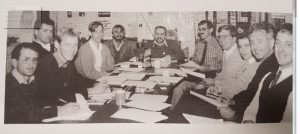
In more recent years, Phil assisted me with quotes, material and photos for a book I wrote about the history of HIV/AIDS in Australia, and I have awaited his own, infinitely more authoritative and extensive book on the same topic.
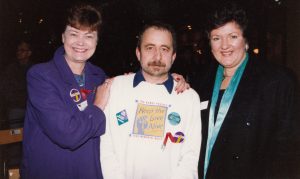
My last interactions with Phil involved another interview, this time regarding his personal philosophies. I had observed him in action and interaction with thousands of people over the years, and he had always been welcoming and inclusive of everyone (from nuns who held hands with the dying, through LGBT+ people and their families who had suffered disadvantage or discrimination, to politicians who might hold the power to make a difference) and this begged the question as to what motivated his lifetime of activism.
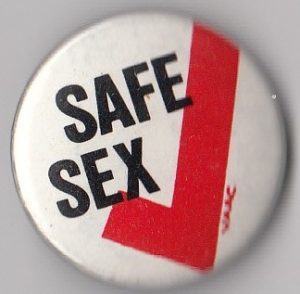
Phil revealed that he was a humanist, having begun moving in that direction during his teens when his mother died, but always happy to spend his life treating everyone with decency and respect due to their common humanity: “An ethical approach to social change for its own sake, human respect and love without preconditions for all – and a framework where all of us can find a place and meaning in our lives, without having to look over our shoulders for imaginary angels and devils. We are worthy just as we are.” His legacy is the lives of thousands of Australians, and probably countless others overseas whose lives were impacted by the community activist empowerment model that he spearheaded.
Queensland Positive People have declared of the passing of their Honorary Member: “We are very grateful to have had Phil with us and will miss him dearly.” Living Positive Victoria eulogised: “Rest in Power Phil Carswell.” The President of Thorne Harbour Health, Janet Jukes OAM, spoke not only on behalf of LGBT+ communities but also of wider Australia (and the world beyond) when she said, “Phil Carswell lived an incredible life and our LGBTIQ+ communities owe him a debt of gratitude for his remarkable contribution to our collective health and wellbeing.”

We should all be thankful for the years of activism that Phil dedicated to helping others, and the generation of young LGBT+ people who no longer have to face the double epidemic of HIV and stigma that Phil helped to fight. I recall in the early 1990s, at a meeting of the AIDS Quilt, Phil commented aloud that a letter had been received from the owners of the building to warn us that asbestos had been found on the property – and he jokingly dismissed the concern, stating that people impacted by HIV/AIDS were more worried about themselves and/or their friends living for another twelve months than worrying about dying thirty years hence. Well Phil, you got your thirty years, and Australia (and the world) are better for it.
Sadly, I will probably be unable to attend Phil’s memorial in Melbourne on 22 April 2024 because I will be doing work in an attempt to help others. I like to think that Phil would approve of the reason that I cannot physically bid him farewell. Instead, I write this humble tribute; and pass on my sympathy to his husband Ian Cherry and to his extended family. Keep the Love Alive.
References and Extra Reading:
Geoff Allshorn, Always Remember, Clouds of Magellan Press, 1 December 2021.
Geoff Allshorn, ‘Rainbow Humanist Pride’, Australian Humanist #145, August 2022, p. 21.
Author Unknown, ‘Death of Legendary Activist for Social Justice, Phil Carswell OAM’, Thorne Harbour Health, 18 March 2024.
Author unknown, ‘Philip James ‘Phil’ Carswell OAM’, Deaths and Funerals, 2024.
Author Unknown, ‘Tribute to the [sic] Phil Carswell OAM‘, Well Well Well, JOY Radio, 21 March 2024.
Author unknown, ‘Unforgettable leader born with a natural curiosity’, The Sydney Morning Herald, 16 April 2024.
Author Unknown, ‘Vale Phil Carswell OAM’, Living Positive Victoria, 2024.
Author Unknown, ‘Vale Phil Carswell OAM’, Queensland Positive People, 18 March 2024.
Phil Carswell, “The view from here”, in HIV Australia, Vol. 3. No. 3, March – May 2004.
Phil Carswell, Founding President’s speech, VAC 25th anniversary celebration, Fawkner Park, South Yarra, 5 April 2009.
Phil Carswell & Alison Thorne, “AIDS and teachers” in The Victorian Teacher, Technical Teachers’ Union of Victoria, 5 September 1983, p. 21,
©2023 Geoff Allshorn

Thanks for this. I too missed the memorial and your words are poignant
A beautiful tribute Geoff that highlights Phil’s immense contribution and legacy.